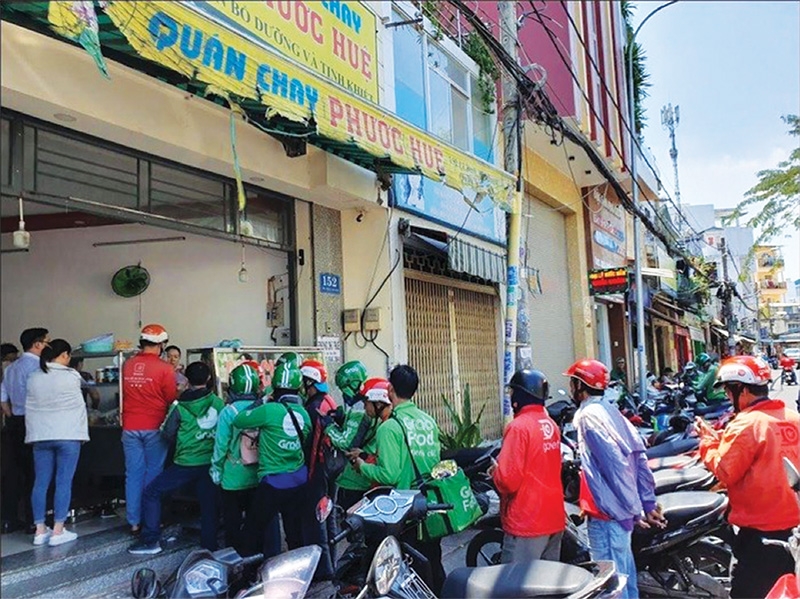Food delivery apps vowing to provide safety and hygiene
 |
| Vietnam’s biggest cities are full of various food delivery options striving to offer the cleanest service |
Last year market research consultant Bain & Company forecast that the number of customers using digital tools in Southeast Asia would reach 310 million by 2025. However, with the appearance of the coronavirus pandemic, both this consulting unit and Facebook have predicted that the milestone would be reached this year.
Along with an increase in use of digital tools, customers are also changing their habits due to the health crisis. A survey published by market research firm Nielsen in March showed that 62 per cent said they will continue to mostly eat meals at home instead of going to restaurants even after the pandemic is cleared up.
The changes may contribute to improving the growth of the food delivery sector. Another survey from market research firm Q&Me in May showed that 79 per cent of respondents order food via an app at least once a week. The colours of uniforms from food delivery service providers GrabFood, Now, and Baemin have slowly been covering every nook and cranny in the city to serve the increasing demand of ordering food, both day and night.
Similar to ride-hailing, the food delivery market has also been taking shape. Despite there being no official statistics relating to market share, Q&Me’s survey places GrabFood as the most popular food delivery provider, accounting for 79 per cent of users, followed by Now (56 per cent) and GoFood (41 per cent).
Being aware of the opportunity to impact current market share, delivery platforms have started to implement new strategies to lure users instead of just racing to burn money on promotion and incentive programmes like previously.
As market leader, GrabFood has been proactive and pioneered issuing policies and new standards for the food delivery industry in recent times, calling on merchant partners to join its Three Standards (delicious, fast, and hygienic) programme to ensure food quality. In order to join the campaign, partners must maintain a star rating of higher than 4.3; the cancel ratio must remain lower than 1 per cent; and the number of complaints regarding food safety from customers must remain at zero within one month of ordering.
Following GrabFood is Baemin, the latest player to become popular particularly in the centre of Ho Chi Minh City thanks to catching up with the trend of healthy eating to meet the demand from customers. Meanwhile, Loship is maintaining its service quietly, without yet experiencing breakthrough growth. Now – one of the first players in Vietnam’s food delivery market – still has chances to strengthen its position after partnering with Shopee last year. And regarding GoFood, it may take further advantage of its parent company’s support. However, the apps have yet to carve out distinct slices of the market.
Nielsen Vietnam has predicted that the change in eating behaviours will last beyond the pandemic, with healthy eating habits becoming the most important factor for customers.
As a result, a number of food delivery apps are being proactive in building relevant strategies. For example, Baemin’s tactics focus heavily on the healthy eating sector, while GrabFood considers safety and hygiene as a core value in order to exploit the market, with it being the key of its Three Standards initiative.
In fact, hygiene is the most crucial criteria for GrabFood’s Three Standards campaign. In order to join the programme, partners must also provide food safety certificates, images of cooking, delivery stalls, and their staff. In addition, Grab will test restaurants’ quality every two weeks to ensure the quality is maintained at a high level.
A representative of Grab said that, once its partners adhere to the strict criteria in its Three Standards campaign, this will be offset by other benefits that increase revenues and profit. In addition, Grab will support the increase of their restaurants’ presence on media channels including the Grab app, Facebook, and through email marketing and review channels. Furthermore, restaurants adhering to the Three Standards scheme will have the opportunity to lure more customers thanks to being a priority for promotional codes that can be offered for customers.
In general, COVID-19 has created a large market space for food delivery service providers in Vietnam, and this potential will expand further when ordering food via apps becomes the norm, the representative added. Thus, food delivery service providers with the deepest understanding of customer demands will be the ones to acquire solid growth.
What the stars mean:
★ Poor ★ ★ Promising ★★★ Good ★★★★ Very good ★★★★★ Exceptional
Related Contents
Latest News
More News
- Vietnam sets ambitious dairy growth targets (February 24, 2026 | 18:00)
- Masan Consumer names new deputy CEO to drive foods and beverages growth (February 23, 2026 | 20:52)
- Myriad risks ahead, but ones Vietnam can confront (February 20, 2026 | 15:02)
- Vietnam making the leap into AI and semiconductors (February 20, 2026 | 09:37)
- Funding must be activated for semiconductor success (February 20, 2026 | 09:20)
- Resilience as new benchmark for smarter infrastructure (February 19, 2026 | 20:35)
- A golden time to shine within ASEAN (February 19, 2026 | 20:22)
- Vietnam’s pivotal year for advancing sustainability (February 19, 2026 | 08:44)
- Strengthening the core role of industry and trade (February 19, 2026 | 08:35)
- Future orientations for healthcare improvements (February 19, 2026 | 08:29)

 Tag:
Tag:



















 Mobile Version
Mobile Version